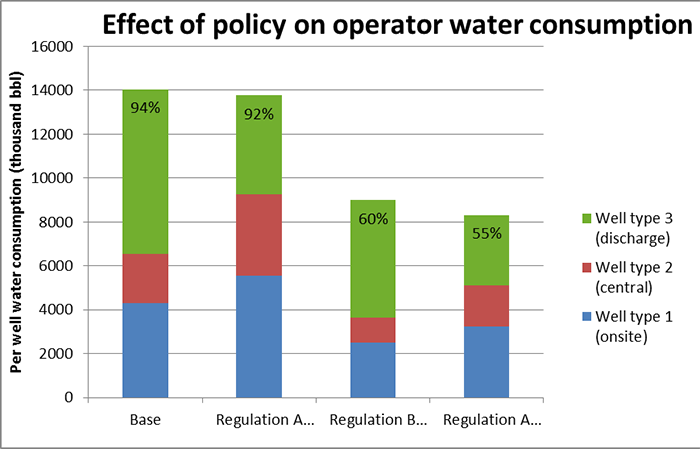Customer Logins
Obtain the data you need to make the most informed decisions by accessing our extensive portfolio of information, analytics, and expertise. Sign in to the product or service center of your choice.
Customer Logins
BLOG
Sep 04, 2013
Collaborating for sustainable water management
I just concluded my presentation on Collaborating for Sustainable Water Management in the Oil & Gas Industry at World Water Week. For readers unable to attend World Water Week, I discussed three major findings from my recent research.
- The oil and gas industry is a consumptive user of water because most wastewater is disposed via underground injection. However, increased oilfield recycling of wastewater could reduce or eliminate water consumption by this industry.
- Operators make decisions about water management based on operational constraints and service costs, both of which vary significantly. This variation must be accounted for in optimization tools. Rules-of-thumb for similar types of wells can simplify decision-making.
- Regulation can reduce water consumption if it incentivizes water treatment. Significant incentives could reduce water consumption by nearly half in some plays.
To reach these findings, I created a cost optimization model for water management in oil and gas operations. I then used Monte Carlo simulation to analyze a hypothetical field of wells in the Barnett Shale and measure the impact of two types of regulation to incentive treatment and recycling.
What the modeling revealed was that with the right mix of incentives and regulations, the well field could reduce its water consumption by nearly 50%.

I will post again next week on some of the other research and findings being presented at World Water Week.
Posted 4 September 2013
This article was published by S&P Global Commodity Insights and not by S&P Global Ratings, which is a separately managed division of S&P Global.
{"items" : [
{"name":"share","enabled":true,"desc":"<strong>Share</strong>","mobdesc":"Share","options":[ {"name":"facebook","url":"https://www.facebook.com/sharer.php?u=http%3a%2f%2fprod.azure.ihsmarkit.com%2fesg%2fs1%2fresearch-analysis%2fcollaborating-for-sustainable-water-management.html","enabled":true},{"name":"twitter","url":"https://twitter.com/intent/tweet?url=http%3a%2f%2fprod.azure.ihsmarkit.com%2fesg%2fs1%2fresearch-analysis%2fcollaborating-for-sustainable-water-management.html&text=Collaborating+for+sustainable+water+management","enabled":true},{"name":"linkedin","url":"https://www.linkedin.com/sharing/share-offsite/?url=http%3a%2f%2fprod.azure.ihsmarkit.com%2fesg%2fs1%2fresearch-analysis%2fcollaborating-for-sustainable-water-management.html","enabled":true},{"name":"email","url":"?subject=Collaborating for sustainable water management&body=http%3a%2f%2fprod.azure.ihsmarkit.com%2fesg%2fs1%2fresearch-analysis%2fcollaborating-for-sustainable-water-management.html","enabled":true},{"name":"whatsapp","url":"https://api.whatsapp.com/send?text=Collaborating+for+sustainable+water+management http%3a%2f%2fprod.azure.ihsmarkit.com%2fesg%2fs1%2fresearch-analysis%2fcollaborating-for-sustainable-water-management.html","enabled":true}]}, {"name":"rtt","enabled":true,"mobdesc":"Top"}
]}

